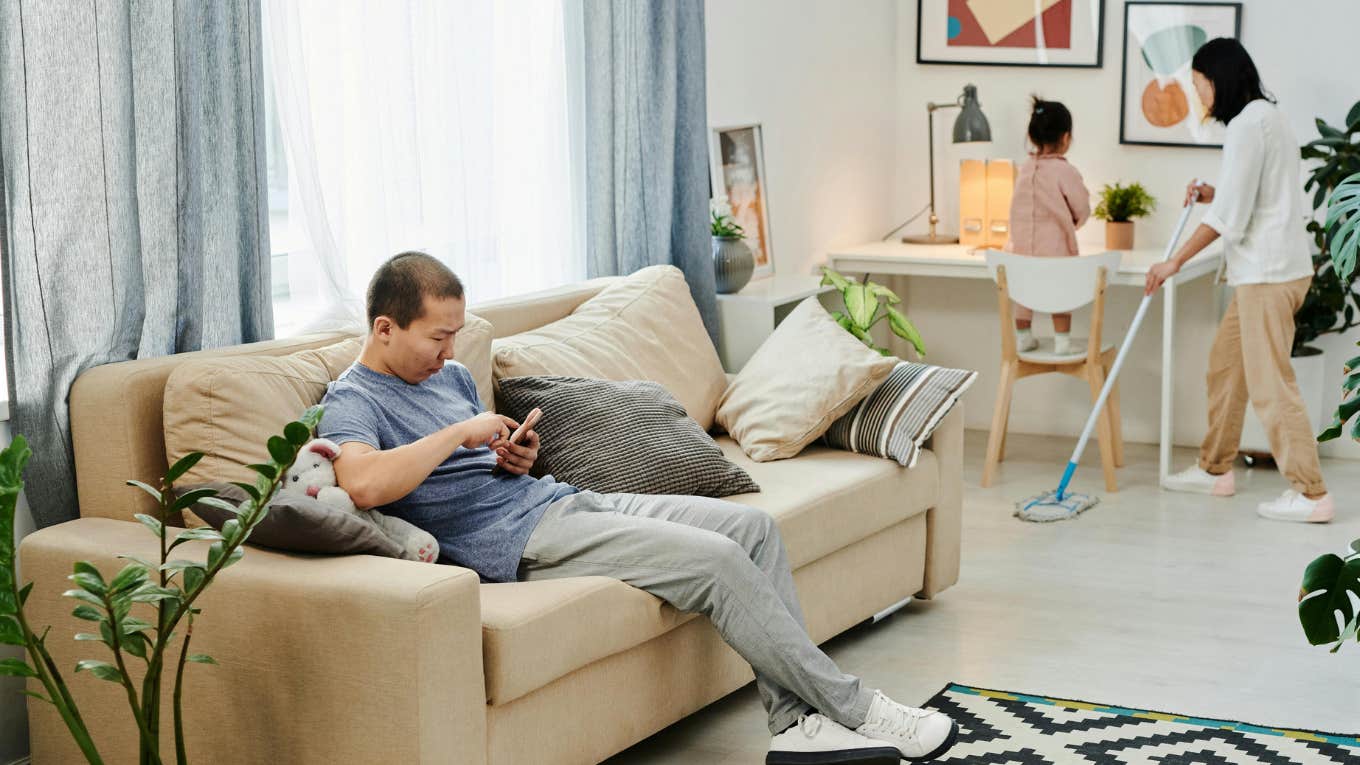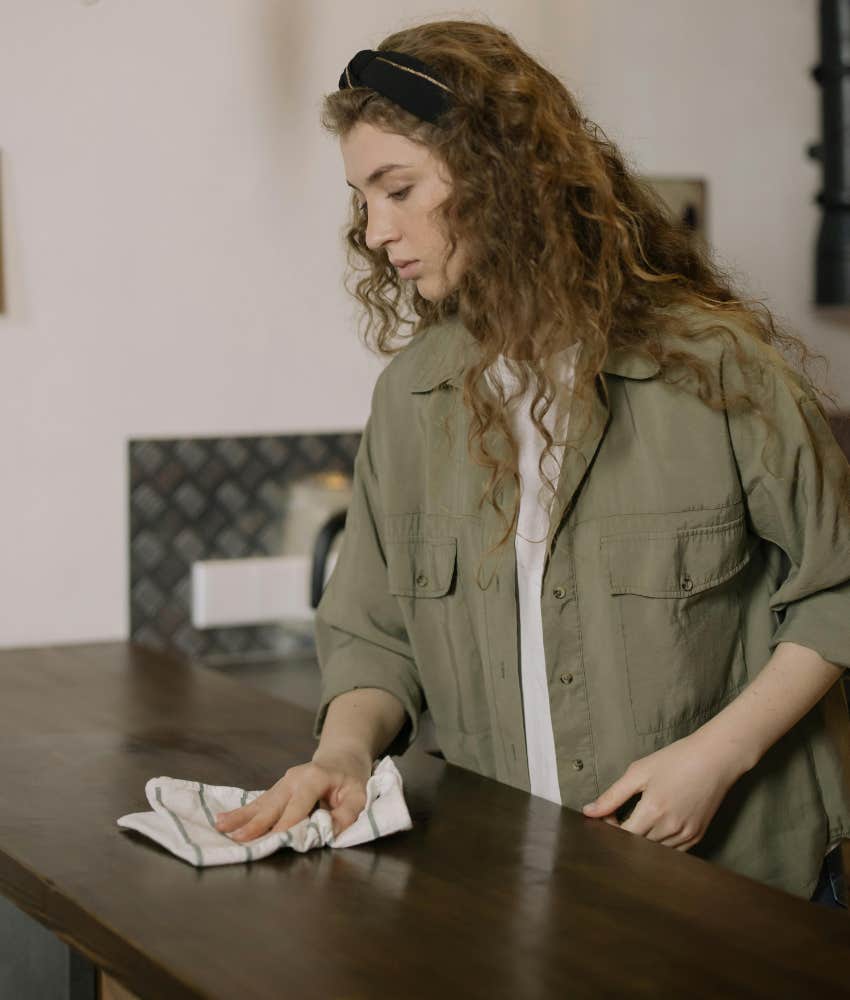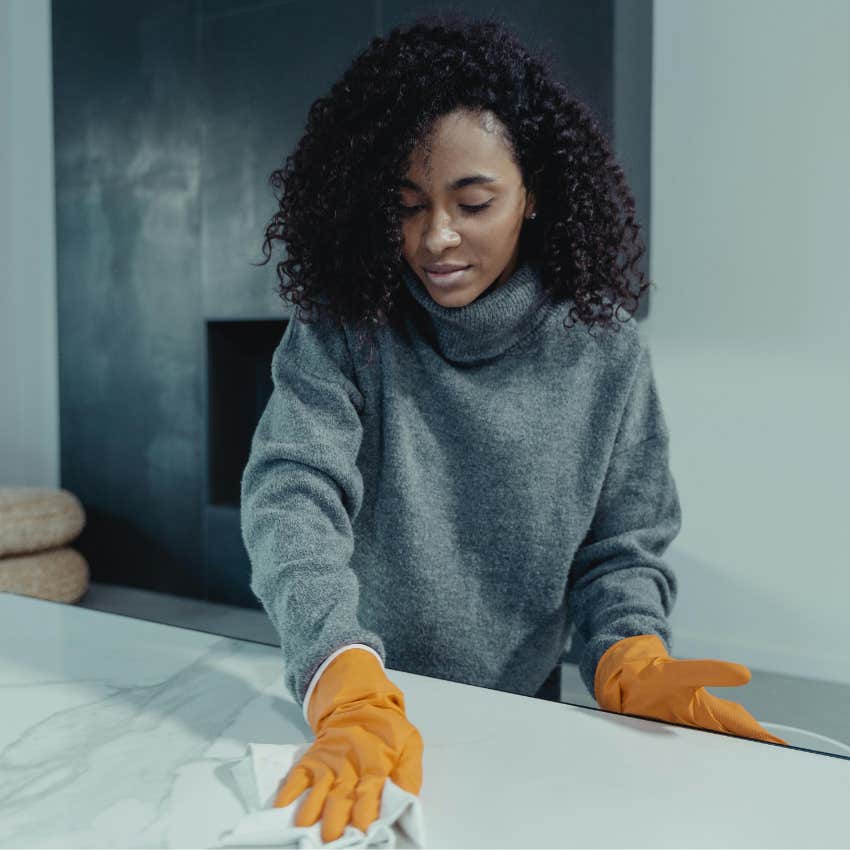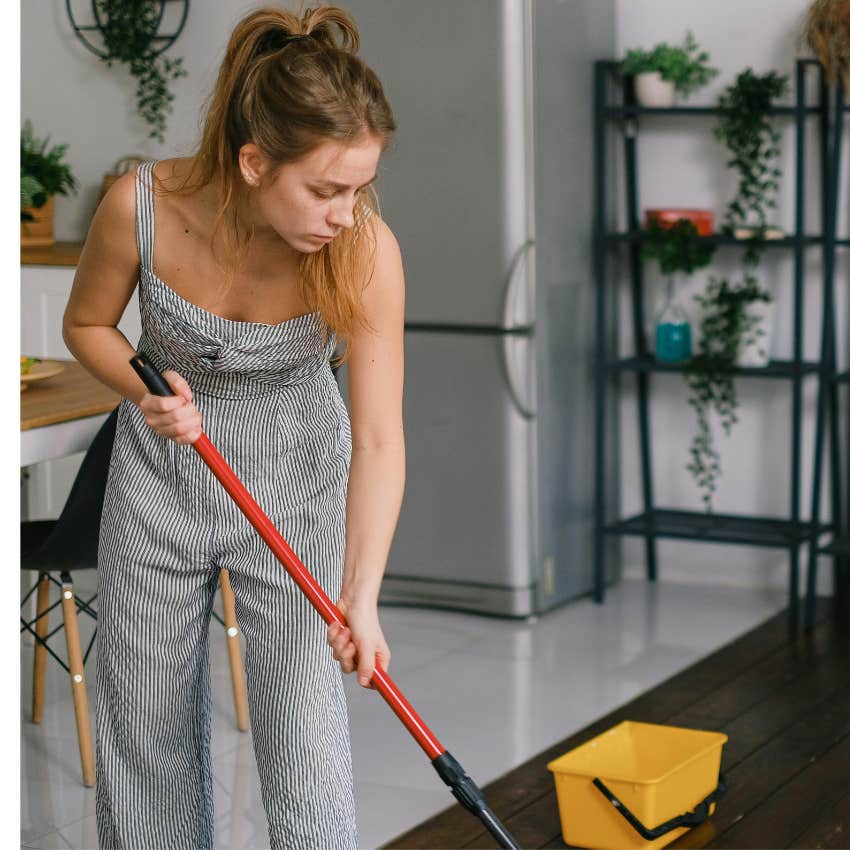Sick Mom Forced To Isolate Comes Downstairs To See Her Husband Hadn’t Cleaned The Kitchen All Week
It's important to remember that cleaning is a morally neutral task.
 Shotpot / Pexels
Shotpot / Pexels Hannah Misra has built her online presence by sharing her journey of “reluctant cleaning,” while also laying bare the vulnerabilities that surround the task of maintaining a household.
Misra recently shared a post that unveiled all the ways our emotions can be tied to acts like cleaning.
The sick mom had to isolate with her son, only to discover that her husband didn’t clean the kitchen all week while she was sick.
“It’s been seven days since I cleaned my kitchen. In fact, it’s been that long since I stepped foot in it,” Misra began her post. “My son and I got Covid while my husband somehow managed to avoid it, so we isolated on the top floor,” she explained.
“The kitchen is so much worse than I could have imagined. I don’t even want to look in the sink. A huge part of me knows how bad it’s gonna be because the entire kitchen smells like vinegar; that means there’s rotting food hidden somewhere.”
Misra filmed herself at the sink, making her way through towering stacks of dishes, saying, “I don’t wanna know what these sticky substances are, because the second that I do, I just want to quit, before explaining that she threw away a cup full of mold “because there’s no saving it.”
“A huge part of me wants to feel shame over how the kitchen looks,” she revealed, despite having been sick for a week without the ability to even enter the kitchen, which is just to say that the level of mess wasn’t connected to what she was or wasn’t doing, but rather the fact that her husband didn’t pick up after himself for a week.
 Photo: cottonbrio studio / Pexels
Photo: cottonbrio studio / Pexels
“I can’t believe how disgusting things are. I don’t know how I’m going to get rid of the smell,” she said. “But I refuse to tear myself down over the state of this kitchen. Most days, I was too exhausted to get out of bed, and when I could force myself off of it, it was to take care of my sick little one. When some of my symptoms started to get better, I was working every day. I also did the laundry and cleaned the entire top floor.”
“Acknowledging what I was able to do doesn’t mean that I’m proud of how my kitchen looks,” she said. “At the same time, I can also recognize that I did the best that I could this week.”
Of the 15,000 comments Misra's post received, many called her husband out for not doing any heavy lifting when his wife was incapable of cleaning.
While marriages might not be inherently equitable and they’re rarely ever 50/50, when one person is low, the other person should make up for that imbalance, out of not just practical necessity, but also out of care for their partner.
“You did the best you could, but did he?” One person asked. “This is about more than not cleaning,” someone else said. “He did not take care of his family while you were sick. Why are you making excuses?”
Misra’s response to the comments was to say, “He doesn’t clean as much as he could. I completely agree. But there are so many ways he contributes that have nothing to do with cleaning.”
“Cleaning up after yourself isn’t ‘contributing.’ It’s taking care of yourself. Don’t justify this,” came another comment, with a harsh, judgmental edge.
Misra returned to the comments, saying, “I’m sorry if it comes off as excuses. That’s not what I want to do, at all. I’m not sure what I’m supposed to say here except he has more value than cleaning.”
“I don’t want it to come across as [if] it’s okay,” she continued. “Because I know it’s not. But he’s helped me find myself so much over the years. And cared for me more than my family of origin.”
 Photo : Tima Miroshnichenko / Pexels
Photo : Tima Miroshnichenko / Pexels
One woman commented, “I’m not going to tell you what to do with your marriage, but I will tell you that you deserve better.”
“I appreciate your kindness,” Misra responded. “I also recognize there were ways he should have done more. We’re both growing in different ways.”
“I hope you grow into the human you’re most proud of, whatever that means for you,” the woman told her. “This is not your fault. Do not feel shame for this,” another person reassured her. ‘“I can’t imagine getting over Covid and having to immediately clean a kitchen that hasn’t been touched in a week when my husband was healthy.”
Misra replied with gratitude, saying, “I appreciate you reminding me [of] the unhealthy and insidious nature of shame. And the empathy for what a stressful experience that was.”
How clean we keep our houses doesn’t dictate our worth as people.
Misra is entirely correct in recognizing that cleanliness is a morally neutral thing. She also recognizes how deep the rivers of internalized shame can run, even when we logically know we are worthy, despite it all.
In a separate post, Misra touched on the complex trauma she has in connection to cleaning, explaining how her experience living in a group home influenced her relationship to cleaning.
“When I lived in a group home, not cleaning meant you lost privileges. It meant that you didn’t get visitation, that you wouldn’t have access to certain foods, that you spent more time isolated in your room,” she explained. “I went to the highest placement of a group home when I was 16. I lived there for a year of my life. Before I got there, I had no idea how to clean,” she revealed. “I remember the first time I failed room inspection … The amount of cleaning shame that I learned in that interaction is something that will stick with me forever. It’s something that I’m still having to untangle.”
“Safety and security [were] tied into the appearance of my room,” she said. “When I look at my relationship with cleaning today, I know it’s impacted by this.”
She described how she’s internalized that sense of shame, saying, “If something isn’t clean, it’s automatically my fault.”
“So much of my cleaning journey has been about unlearning toxic cleaning habits,” she continued. “I know I don’t have to go about this alone. On a logical level, I know that I should reach out for help. I know that I should be able to voice what I need, but when I’m advocating for myself, it’s like my voice goes away.”
“I learned that to voice my needs meant that it left me vulnerable. It provided opportunities to be exploited, and that’s carried over into almost every aspect of my life,” she said.
“Part of the reason I started doing cleaning content was because I couldn’t see the amount of effort that I put in; instead, I looked at all the things I was failing at. I was so fixated on the outcome that I couldn’t see everything I was juggling.”
In her perspective, cleaning and maintaining her family’s home are “acts of service … A way to express my love for my family.”
 Photo: Shvets Production / Pexels
Photo: Shvets Production / Pexels
“When I look back at my time in the group home, I hope that version of me would be proud of the me today,” she said. “The one who’s still growing and healing … The one who takes care of her loved ones in a way that she was never taken care of.”
“I honestly think the me who survived the group home would be amazed at our life today,” she shared. “That I have a beautiful family today that knows I love them. That the hauntings from the past are no longer as loud as they used to be, and that I’m no longer hidden away behind closed doors.”
“My relationship with cleaning started in a group home. It started in sickness,” she said. “That’s part of the reason things are messy and imperfect. I’m still trying to figure out what’s normal, what expectations I should have of myself and of others.”
“I know it looks like my home is always a hot mess,” she said. “If I focused on that too much, it would devastate me. Instead, I’ve learned that the only comparison I need to make is where I came from.”
Misra's message has very little to do with cleaning and more to do with her own journey.
The content Misra shares is hugely complex and should be looked at with compassion and nuance. She’s doing the hard and continuous work of healing a trauma, which is never something linear. She, like so many of us, may have learned that keeping clean is connected to our value as people. Yet she, like, all of us, has value just by virtue of breathing.
The issue isn’t what strangers on the internet think about her home, her mess, or her husband. It has more to do with the ways we care for ourselves and how we allow ourselves to be cared for.
Misra deserves to give herself compassion, both in sickness and health. Loving ourselves and showing up for the kind of love we all innately deserve is a lifelong process that takes root as healing makes its home within us.
Alexandra Blogier is a writer on YourTango's news and entertainment team. She covers social issues, pop culture analysis and all things to do with the entertainment industry.
